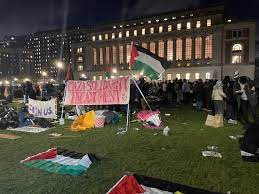US Pro-Palestine Demonstrations Continue With “We’ll Risk Expulsion, Arrest”
There’s a cause celebre resounding across Harvard Yard, Yale’s Beinecke Plaza, Columbia’s South Lawn, and UC Berkeley’s Sproul Plaza: Declare and give up.
Additionally, college students have said that they will not stop opposing Israel until their demand is fulfilled.

“We’re willing to risk suspension, expulsion, and arrest, and I think that will put pressure on us,” protest leader and University of California, Berkeley law student Malak Afaneh said.
She and other pro-Palestinian protestors want colleges to stop funding anything related to Israel and the armaments that are fueling the Gaza War. This includes money managed by Google, BlackRock, Amazon’s cloud computing platform, Lockheed Martin, and even Airbnb.
This is a bold request since legislators and university administrators have opposed the Boycott, Divestment, and Sanctions campaign against Israel for many years, seeing it as antisemitic due to its criticism of the Jewish state’s legitimacy and its focus on the actions of a single nation.
Many donors and alumni are vehemently against it, and legislation in over half of the US states—including New York and California—forbids operating on the BDS principle. It’s doubtful that this will alter very soon.
California Assembly Democratic Caucus Chair Rick Chavez Zbur said, “I have consistently opposed all forms of antisemitism, including discrimination against and demonization of the people of Israel through the BDS movement.” “I would strongly oppose any attempts to change laws protecting against such discrimination.”
However, since October 7, when Hamas attacked Israel and ignited the Gaza battle that has claimed tens of thousands of Palestinian lives, it has gained supporters, particularly among students at prestigious colleges.
On the campus of the college, they are yelling, banging drums, donning keffiyehs, and waving Palestinian flags. Campus encampments have proliferated; at Harvard, the Harvard Crimson reports that around thirty tents are now positioned in front of the John Harvard monument.
Protesters have threatened Jewish students and shown sympathy for Hamas, an organization that the US has categorized as terrorist. These incidents have occurred at Berkeley and Columbia, among other campuses.
Because of all of that, colleges are finding it difficult to strike a balance between the need to maintain order and guarantee student safety and the right to free expression. However, they remain unchanged over the divestiture issue.
At about $51 billion, Harvard has the greatest endowment in the United States. This month, the university made it plain that it “opposes calls for a policy of boycotting Israel and its academic institutions.” Throughout the eight-day hunger strike spearheaded by students, Brown declined to respond to BDS requests. This week, police gathered up protestors outside the Schwarzman Center and arrested over 40 students. Yale will not even entertain a motion to withdraw from manufacturers of firearms.
Supporters of BDS draw inspiration from recent campaigns encouraging schools to address fossil fuel holdings as well as the apartheid period campaign to isolate South Africa, which included steps taken at the time by Columbia, Michigan State, and California institutions.
There’s no desire to cut relations with Israel this time at Michigan State, where groups of students have set up camp in People’s Park.
Speaking earlier this month at a Board of Trustees meeting, Sandy Pierce, the chair of Michigan State University’s board, stated that “divestment would conflict with stewarding the institution’s financial health, would increase investment risks, limit returns, and jeopardize the assurance that resources will continue to be available now and for future generations.”
Months before students erected tents on the Morningside Heights campus and incited a confrontation with the university that led to over a hundred arrests, Columbia rejecteda request in February to discontinue financial assistance from Israel.
27-year-old Ray Guerrero, who is pursuing a master’s degree in public health, contributed to the writing of the Columbia University Apartheid Divest coalition’s divestment plan. The organization has a long list of demands, which include severing links with Israeli academic institutions, defunding public safety, and paying reparations to New York’s indigenous population. Guerrero emphasizes that transparency and divestiture related to Columbia’s $13.6 billion endowment remain the primary emphasis for the time being, while acknowledging that the targets are ambitious.
A member of CUAD’s research team, Layla Saliba, 24, is pursuing a master’s degree in social work. She claims that the team has been examining the school’s financial disclosures, such as its tax forms and 13Fs reports to the Securities and Exchange Commission.
“We were only able to get about 0.6% of their investments as public information,” she said.
Only $47 million of its assets are disclosed in the most recent 13F, the great majority of which are shares in Warren Buffett’s Berkshire Hathaway. Billions of dollars remain unreported as a result.
“That’s really concerning because our endowment, yes, it’s funded by benefactors; it’s funded by donors, but a portion of that is also funded with our tuition dollars,” Saliba said. “And we feel that, as students, we need to have more transparency on that.”
Academics dispute the demonstrators’ assertions.
In a statement, the University of California said that tuition money is not invested in any way and expressed opposition to any boycott of Israel. Donations and investment earnings are the primary sources of funding for college endowments. Additionally, they pay for additional running costs, including instructor salaries, as well as financial help for students.
Furthermore, the issue goes beyond ideology. Large concentrations of individual equities are seldom held by endowments now, as they were decades ago, when campaigners targeted South African-based businesses.
Endowments have historically depended on outside managers, such as hedge funds and private equity companies. Endowment assets of around $840 billion are held by over 700 institutions. ETFs, index funds, and mutual funds that aggregate hundreds of stocks and bonds are also used by them.
While hedge fund managers may quickly move in and out of stocks without notifying investors of their transactions, private equity firms may lock up a school’s funds for years without giving them the opportunity to withdraw them.
“These active strategies are not buying stocks to hold on for the long term,” said Philip Zecher, the $4 billion fund’s chief investment officer at Michigan State University. “Their goal is to profit from trading. It’s not like when your grandmother buys shares in AT&T and hoards them for fifty years.”
Students have been fighting for decades to stop investing in fossil fuels, and this movement demonstrates how difficult it may be to really execute divestment. Universities have committed to regulations aimed at reducing greenhouse gas emissions on campus, but they haven’t really changed tactics to sell assets, which are usually locked up in long-term private equity funds.
Some pro-Palestine protestors are unfazed by the obstacles and backlash.
One Yale student who participated in the protests this week and spent the night in Beinecke Plaza was Lumisa Bista, a junior studying astrophysics. “It seems like a no for now, but students will keep pushing,” Bista said. “I’ll keep pushing.”







